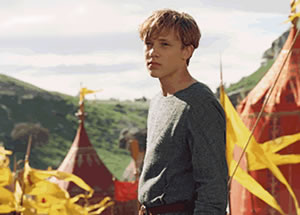the holy glimpse
All children start out as natural mystics. Unfortunately, most of us forget our childhood mysticism almost completely. But one person who does remember is Ray Bradbury, an American genius of the mystic heart. Bradbury is an unusually versatile writer—the eternal misplacement of his books on the science-fiction shelves obscures his range, which spans from drama, mystery, and horror, to whimsy and heart-whirling poetry. Yes, a significant portion of his output is sci-fi, but all of it is what I call “spi-fi”—spiritual fiction—whether set in outer space, small-town Illinois, or Los Angeles.
excerpt
Douglas opened one eye.
And everything, absolutely everything, was there.
The world, like a great iris of an even more gigantic eye, which has also just opened and stretched out to encompass everything, stared back at him.
And he knew what it was that had leaped upon him to stay and would not run away now.
I’m alive, he thought. . . .
The grass whispered under his body. He put his arm down, feeling the sheath of fuzz on it, and far away below, his toes creaking in his shoes. The wind sighed over his shelled ears. The world slipped bright over the glassy round of his eyeballs like images sparked in a crystal sphere. Flowers were suns and starry spots of sky strewn through the woodland. Birds flickered like skipped stones across the vast inverted pond of heaven. His breath raked over his teeth, going in ice, coming out fire. Insects shocked the air with electric clearness. Ten thousand individual hairs grew a millionth of an inch on his head. He heard the twin hearts beating in each ear, the third heart beating in his throat, the two hearts throbbing his wrists, the real heart pounding his chest. The million pores on his body opened. . . .
“Tom!” Then quieter. “Tom . . . does everyone in the world . . . know he’s alive?”
“Sure. Heck, yes!”
“I sure hope they do,” whispered Douglas. “Oh, I sure hope they know.”
Dandelion Wine is set in Green Town, Illinois, (a pseudonym for Waukegan) in the summer of 1928. It’s episodic, a novel woven from short stories of the magic and tragedy of life seen through the eyes of Bradbury’s alter ego, Douglas Spaulding.
Douglas is a normal twelve-year-old who finds himself suddenly jolted into the awareness of life itself, the experience of truly being alive. (See excerpt.) Douglas is amazed to actually be awake to Reality, and flabbergasted that he had been asleep till then.
The entire world is fresh and new, and Douglas resolves to never go back to sleepwalking through life, but to hold on to this sacred awareness forever. He begins writing a spiritual journal, divided into two sections, Rites and Ceremonies, and Discoveries and Revelations, thus inviting the summer to begin its majestic unfolding.
holding on
There’s only one problem, one which everyone who knows this experience can identify with, which is that all experiences, even these holy glimpses, are transitory. Yet their beauty invariably makes us who experience them to want to hold on. We become “seekers”, wanting to live in the Kingdom of heaven, even though the wanting itself lowers the curtain.
This tricky thing of holding on permeates Dandelion Wine. The problem is not of recording moments and returning to them—the past is honored throughout. For instance, one wonderful character is Colonel Freeleigh, an old man who becomes a living time machine for Douglas and his friends, who takes them to his memories of the Civil War or of Buffalo Bill’s Wild West show. Bradbury repeatedly uses the image of bottling the wonder of a moment, a day, or a place, by capturing its air or pressing wine to be bottled and aged. Bottling dandelion wine is a yearly tradition for Douglas’ family:
The wine was summer caught and stoppered. And now that Douglas knew, he really knew he was alive, and moved turning through the world to touch and see it all, it was only right and proper that some of his new knowledge, some of this special vintage day would be sealed away for opening on a January day with snow falling fast and the sun unseen for weeks…
Rather, the problem is what the Buddha called tanha—grasping to find happiness or identity itself. One of Douglas’ neighbors decides to create a Happiness Machine, and ends up destroying it for the grief it causes.
impermanence and suffering
From its beginning of unbridled hope, the summer immerses Douglas in increasing levels of disappointment and pain. At first, some of the hurts are almost trivial, such as the final ride of the town’s beloved trolley, but they increase quickly. Just as the Buddha experienced the whole world of suffering from four tragic sights in one day, Douglas experiences the whole world of suffering from the events of one summer.
His best friend moves away, leaving him feeling like part of him has been torn away. Douglas is left with only his younger brother to share his thoughts with, and begs him never to leave:
“You can depend on me, Doug”, said Tom.
“It’s not you I worry about,” said Douglas. “It’s the way God runs the world.”
Tom thought about this for a moment.
“He’s all right, Doug,” said Tom. “He tries.”
Life forces Douglas to grow up quickly. He witnesses a deadly hit-and-run accident, and takes on the burden of keeping it secret to avoid sending the drivers to jail. A serial killer terrorizes Green Town, and Douglas is there when he claims another victim. The awareness of death and suffering becomes inescapable. Over the course of the summer, most of the old people he has come to know and love pass on.
the freedom of non-attachment
Douglas is learning a lesson that so many of us never learn—that nothing lasts, and because of our desperate attempts to hold on to changing things and people, we suffer. There’s an interplay of youth and age taking turns teaching the importance of not holding on and accepting change.
For instance, Tom, just two years younger than Douglas, is largely still in a stage of innocence. He has never lost his essential trust, and accepts everything as it comes, good and bad, with peace and joy. Tom acts a spiritual director for his older brother.
Another case: Neighborhood children torment old Mrs. Bentley by telling her they don’t believe she was ever young, or that the little girl in her photographs was ever her. She finally sees that she’s wasted decades reliving memories of her youth, and sets herself free by burning all her keepsakes and “admitting” to the kids that she never had a past.
Another old woman and a young man recognize each other from a previous life, where he had been too old, and she too young. As she senses her death approaching, she gives him instructions so they can sync up in their next life:
You must promise me not to live to be too old, William. If it is at all convenient, die before you are fifty. . . . I advise you this simply because there is no telling when another Helen Loomis might be born.
And finally, there is Great-Grandma, who announces her death to her family like a Zen master to his disciples. She compares shedding the body to a snake shedding its skin and the body shedding its cells. She sees her true self as a boundless being that includes all she loves:
Important thing is not the me that’s lying here, but the me that’s sitting on the edge of the bed looking back at me, and the me that’s downstairs cooking supper, or out in the garage under the car, or in the library reading. All the new parts, they count.
For Douglas, this is the straw that breaks him. He can deal with all the death he’s encountered so far, but not the loss of his own loved ones. A few days later, faced with the undeniable fact of his own mortality, the young mystic himself has lost the will to live, and lies dying of a mysterious fever in his bedroom.
the practice of awakening
I will not discuss how Douglas is saved (read the book!), but I want to point out the change in his purpose from his revelation at the beginning of summer to its conclusion. Spiritual experiences such as Douglas’ at the beginning of the book are not rare. Yet most people’s minds are so full of noise, that they cannot make an impact, like the grain choked by the weeds in Jesus’ parable. Worldly concerns never give them a chance to grow, and so we live life as though nothing ever happened, as though we were not touched by God, and did not glimpse for a sacred moment the overwhelming divine Presence in all things. We don’t hear the alarm, and never rouse from the slumber we mistakenly call life.
Others, though, see this for what it truly is—actually seeing the nature of things, the meaning of life itself, God within all. We are amazed by the beauty and wonder of life, and overflow with unbearable love. Our spirits open up.
There is only one thing left: Our own ego’s desire to hold on—for this to be the once-and-for-all transformation, “Big E” Enlightenment, theosis, union with God. The flipside of this attachment is aversion, an unwillingness to accept life as constant change, full of sorrow as well as joy, and love it all anyway.
When Douglas renews his commitment to life, he does so unconditionally. He goes to work as a spiritual warrior, eager to do whatever he can to bring more love and beauty into the world, not shy of the difficulties and pain. He relishes living for its own sake, not for the joys that come from it. The light-hearted final story presents the Spaulding kitchen as the field of battle between light and darkness. It’s a charmer.
Dandelion Wine is an amazing book. It’s a genre apart, blurring distinctions between novel, short story, prose, and poetry. It should be read slowly, savoring the words in the heart as Douglas savors a taste of dandelion wine in his mouth. This has been one of my favorite books since I first read it in high school. But I’ve never really seen it till now. A year ago, in his Spiritually Incorrect Enlightenment, Jed McKenna made the assertion that Moby-Dick was an epic on awakening by an unrecognized spiritual master. Perhaps it is; I’ll have to read it again, sometime. But I know without a doubt that Dandelion Wine is. Simply put, this one of the greatest books ever written. Let it touch you.
Related pages and posts:




